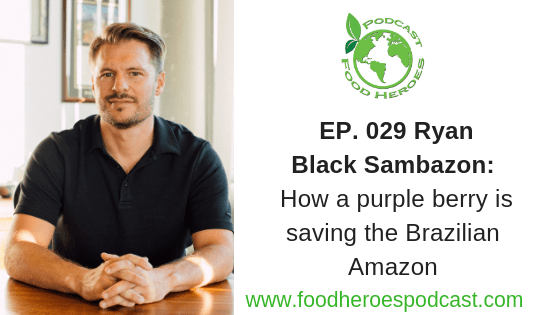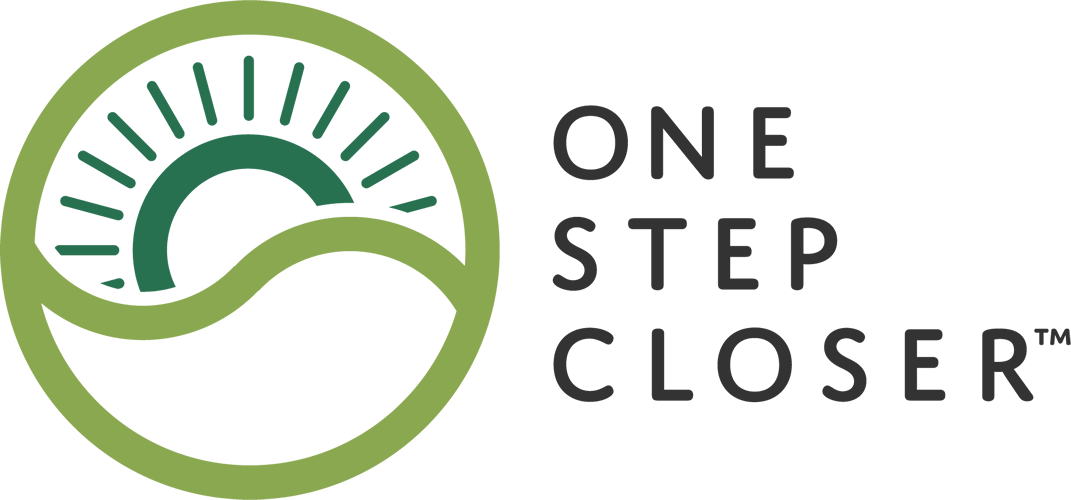April 29, 2019 by dev_team
OSC2 Member and CEO of Sambazon, Ryan Black, featured on the Food Heros Podcast

Love acai berries, the purple hair, and Amazonian rainforest? Check out Ryan Black’s interview on the Food Hero’s Podcast.
What you’ll learn in this episode:
- Ryan’s first encounter with acai
- The history and benefits of acai
- How acai is grown and processed
- How Ryan brought this superfood to the American market
- How Sambazon established organic and fairtrade standards for acai
- Ryan’s other social and eco-preneurship projects
- Sambazon’s future efforts to be environmentally conscious
Originally posted on the Food Hero’s Podcast
An “eco-preneur” and CEO of Sambazon, Ryan Black starts the conversation by teaching us how to say acai (“ah-sah-YEE”), which was only his first obstacle when introducing the American market to the superfood.
Nowadays, the berry can be found almost anywhere from your smoothie shop to your energy bar, and Ryan helped make that happen. And yet, as prevalent as the superfood seems, barely 20% of the population knows what acai is.
What is acai?
Ryan’s relationship with the berry starts on a beach in Brazil in 1999, where he had his first acai bowl. But acai doesn’t grow on the beach – it grows in the Amazon.
“It was and is a staple of the Amazon rainforests people’s diets because it has healthy fats, protein, and fiber,” he tells us. “This calorically-dense fruit is more like an avocado than a berry. It doesn’t have any acid or sugar in it.”
In the 1990s, the Gracie family, famous for their development of Brazilian jiu-jitsu, froze the berries from the Amazon and brought them to Rio de Janiero. There, they combined it with fruits and blended it with a bit of sugar to bring out a rich, cacao-like flavour.
“It’s light on your stomach,” Ryan says, but “that’s why these jiu-jitsu guys were training with it: it’s very filling.” And as the jiu-jitsu scene started eating it, word of this tasty new superfood spread to the Brazilian surfer scene, and soon enough, acai was trending.
Starting Sambazon: Setting the Organic and Fairtrade Standards for Acai
Ryan wanted to guarantee that his supply chain was ethical, but because the acai industry was so new, there were no standards. Traditionally, acai farmers bring their berries to an open market to sell to processors. There wasn’t any visibility on how the berries were grown.
So Ryan did what any social entrepreneur would do: he sent USDA organic and fairtrade certifiers to the Amazon, and they established the standards for acai farming. Ryan believes “Organic certification is about traceability, it’s about chain of custody, it’s about knowing where the ingredient is coming from.”
Beyond Berries
Ryan’s efforts as an eco-preneur don’t stop with Sambazon. He has joined and started multiple initiatives to encourage innovative entrepreneurship.
Purple for the Planet is a social engagement campaign from April 22 through May 22 to encourage environmental activism. For every customer that dyes their hair purple and posts a selfie, Sambazon will purchase 5 acres of Amazonian rainforest through Rainforest Trust’s Save-an-Acre program. They found that, for every 584 acres protected, one animal species can be saved!
The Tri (pronounced “tree”) was co-founded by Ryan and other businesses to promote consumer advocacy. The organization encourages consumers to vote with their dollar, not just for what goes in their bellies, but for the future of the planet.
And this concept of voting with our dollar is the core of Ryan’s entrepreneurial spirit. “You can participate every single day with how you spend your money and voting with your dollars for the type of future that you want.”
Listen to this episode to learn more about how you can participate in Ryan’s entrepreneurial efforts! And if you like what you’re hearing, consider buying me a virtual cup of coffee.
LINKS MENTIONED:
Facebook, Instagram, Twitter, Pinterest: @Sambazon
Sambazon.com
Thetri.org
One Step Closer to an Organic Sustainable Community: osc2.org
The Greenhouse Initiative: theecologycenter.org/sambazon
If you like this topic check out these episodes :
Following the global superfood chain back to the farmers and fisherfolk with Ann Shin
Breaking the global poverty cycle in coffee communities with Max Rivest
Fighting to protect the global coffee supply chain from climate change with Amelia Franklin.
Did you like this?
Thank you for listening to this episode! If you enjoyed it, please feel free to share it using the social media buttons on this page.
I’d also be VERY grateful if you could rate, review, and subscribe to Food Heroes Podcast on Apple Podcasts. Or, if you use Stitcher, you can leave a review right here.
That all helps a lot in ranking this show and would be greatly appreciated. And if you have any comments or questions, leave a comment below!
If you need a little help navigating Apple Podcasts check out the tutorial I made Here.
